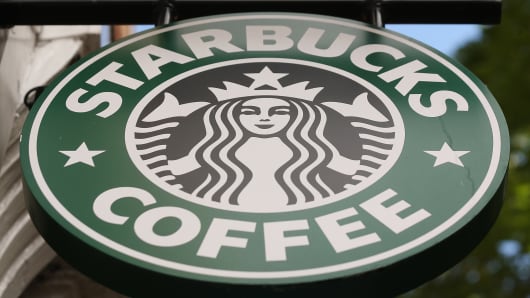Revelations surrounding the U.K. tax affairs of coffee chain Starbucks have angered many campaigners, but some have told CNBC that the U.K.'s tax rules rather than the company itself are to blame.
Reuters reported on Tuesday that the U.K. subsidiary of the firm has paid 8.6 million pounds ($13.7 million) in income taxes since 1998 despite having sales of over 3 billion pounds ($4.8 billion) — with Starbucks paying no tax at all in the last three years.
The accounts show that the company has managed to legally report losses each year that have reduced its tax burden. However, Reuters reported that despite this, Starbucks has consistently stated to shareholders that its U.K. unit has been profitable.
"We will continue to pay our fair share of taxes to the letter of the law in the U.K. as we always have, " a spokesperson for Starbucks told CNBC.com, adding that the firm has an overall corporate tax rate of 31 percent, with the average rate being 18.5 percent for multi-national U.S. corporations.
The Occupy London movement , a campaign dedicated to opposing what it saw as corporate greed in the City of London, was derided in the British Press last year when members of the group appeared to be using the coffee chain.
A spokesperson for the group, Ronan McNern, told CNBC that the campaigners would not rule out a new occupy movement directed at Starbucks in their upcoming march on Saturday October 20.
"It's not off the agenda, it's an interesting one to consider, " he said. "It's one rule for them and another rule for small businesses."
Michael Meacher, a U.K. Labour Party politician who also campaigns against tax avoidance, was quick to condemn the company on his personal website.
"The banks and big business are making monkeys out of the government, " he said. "How do they get away with such greed and evasion?"
HM Revenues & Customs, the department that processes company accounts in the U.K. was unable to comment directly on individual businesses but it told CNBC that it makes sure that multinationals pay the right tax to the U.K. in accordance with laws.
"The U.K. has 'transfer pricing rules' which ensure that U.K. profits are not reduced by the mispricing of transactions between companies in a group, " it told CNBC.com.
"There are also anti-avoidance rules, known as 'controlled foreign company (or CFC) rules', which prevent groups based in the U.K. from shifting profits from significant U.K.-based activities to a country with a lower tax rate."
An independent grassroots campaign for lower taxes, the Tax Payers' Alliance, believes that the regulations are to blame, rather than Starbucks itself.
"There has been a succession of companies from high street names to internet giants who, thanks to the labyrinth of our tax system, appear to be paying much less in tax than many people would expect, " it told CNBC.com.
"If Britain wants to remain competitive and ensure everyone pays their fair share then we need radical reform that restores legitimacy to our tax code and kick starts economic growth."
CNBC.com contacted several of Starbucks' shareholders but all were unable to comment on individual stocks.
Correction: In an earlier version, the story incorrectly stated that the firm's UK subsidiary paid $13.7 billion in income taxes since 1998. The figure should, in fact, be $13.7 million.


